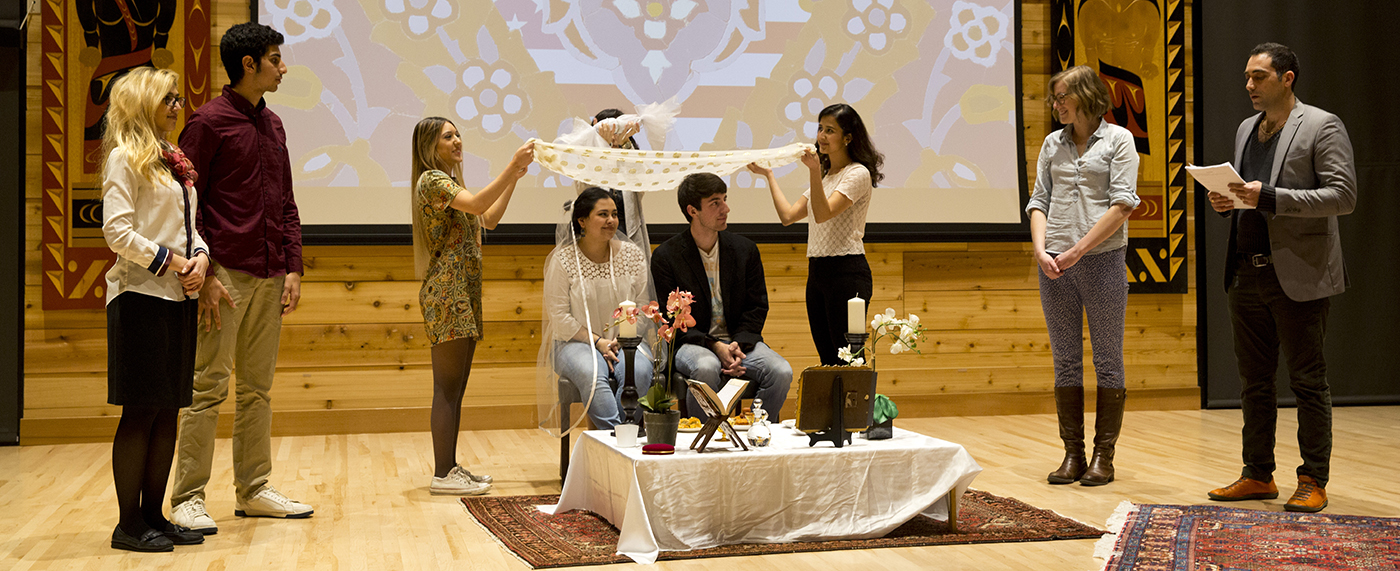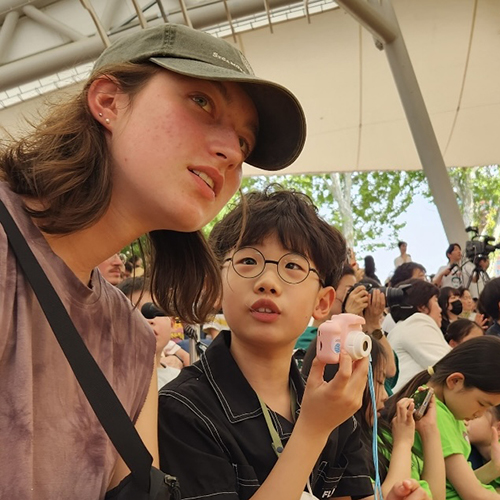UW senior Rhoya Sarikhani Selden is a mini-United Nations. Her mother emigrated from Iran in the 1970s. Her father’s family has lived in Seattle for more than a century and has British and Lithuanian roots. Her grandparents are Muslim, Jewish, and Mormon. Her stepmother is Peruvian. There are languages spoken in both parents’ homes — Farsi in her mother’s, Spanish in her father’s — that Sarikhani Selden doesn’t speak. “I’m in a no-man’s land,” she says. “When I have to check the ‘race’ box on forms, I don’t feel like I belong in any category. But in a way, I can connect to many cultures, which is an advantage.”
Sarikhani Selden decided to explore her Persian roots in a senior thesis for each of her majors, history and drama. For history, she looked at the politics behind women’s clothing in Tehran at critical moments in the 20th century. For drama she produced a play, A Mosaic of Tehrangeles, about the Iranian American experience. The play — made possible with support from a Mary Gates Leadership Scholarship — was presented to a sold-out crowd at the UW’s Intellectual House in February 2017.

The idea for the play grew out of Sarikhani Selden’s experience working backstage on a School of Drama production of Arabian Nights. She had been excited to work on the show, but was disappointed to find that the production did not accurately represent Middle Eastern culture. “It was a very Orientalist, romanticized, and eroticized blending of cultures and communities, almost fetishizing them,” she recalls. “I wanted to make a show that represented my culture accurately and authentically.”
Sarikhani Selden’s play is based on interviews with nearly two dozen Iranian Americans, from teens to grandparents. Some are recent immigrants, others are American-born. Though Sarikhani Selden had intended to present a single storyline in the play, the interviews inspired her to change her approach. “The people I interviewed had so many amazing and different outlooks and experiences,” she says. “I learned so much from their stories — even about myself — and realized a single plot wouldn’t capture that.”
I grew up in a multicultural family and it’s a beautiful thing. ...We don’t need to fear different cultures and different people. Every culture has something to contribute.
Collaborating with co-writer and co-director Eli Gallagher, a UW sophomore, Sarikhani Selden structured the play as a series of vignettes and monologues. “The spine of the play is about resilience,” she says. “It’s about coming together in the face of hardship and overcoming differences, whether that involves dealing with racists or coming out to one’s parents or trying to assimilate in an Islamaphobic culture.”
All seven cast members are of Persian descent. Three recently emigrated from Iran; two came to the U.S. as refugees. “The cast is predominantly female, and the female characters play a special role because women are the ones who make sure the culture is passed down to future generations of Iranian Americans,” explains Sarikhani Selden. “They keep our identity alive and our traditions preserved.”
The play was presented just days after President Trump proposed a ban on immigrants from seven Muslim-majority nations including Iran. Interest in the production was so intense that tickets sold out before Sarikhani Selden even produced posters advertising the play. The venue was reconfigured to accommodate 180 guests, more than double the original estimate.

Sarikhani Selden was worried about more than logistics during the production. “I was so scared that Iranian people in the audience would say, ‘No, that’s wrong,’ but I’ve only received positive feedback,” she says. “People have told me it was meaningful to them to see their heritage on stage. They cried in parts of the play because it touched them so much. I wasn’t expecting that. It completely made all the stress, all the craziness, worth it.”
Sarikhani Selden’s history thesis also reflects her heritage and interests. Building on her passion for history and her interest in costume design, she researched the politics behind women’s clothing in Tehran during three distinct periods of the twentieth century. She focused on the 1930s, when traditional Persian clothing was made illegal; the 1960s and 1970s, when fashionable Western clothing was the norm; and the 1980s onward, when Islamic clothing became mandatory, with women completely covered except for their hands and face. “Clothing can be very political,” says Sarikhani Selden. “It’s not just what the women wore, but why they wore it or were required to wear it.” Sarikhani Selden’s thesis received a Library Research Award for Undergraduates from the UW Libraries.
After Sarikhani Selden graduates in June, she may apply to law school, with a focus on civil rights for Middle Eastern communities. She also may further develop her play, encouraged by audience members who have urged her to continue with the project. Whatever her next step, she is convinced that her diverse background will only be an advantage.
“I grew up in a multicultural family and it’s a beautiful thing,” she says. “It’s one of my favorite things about myself. We don’t need to fear different cultures and different people. Every culture has something to contribute. What makes America beautiful is the mixture of them all.”
More Stories

Is This Presidential Campaign Different?
UW History professor Margaret O'Mara provides historical context for this moment in US presidential politics.

Making Sense of This Political Moment
To navigate this momentous election season, Arts & Sciences faculty suggest 10 books about the US political landscape.

Finding Family in Korea Through Language & Plants
Through her love of languages and plants — and some serendipity — UW junior Katie Ruesink connected with a Korean family while studying in Seoul.